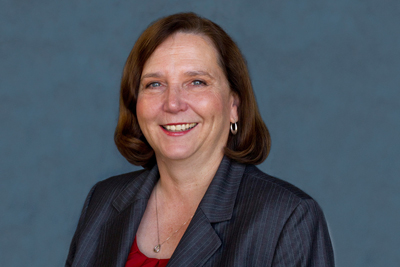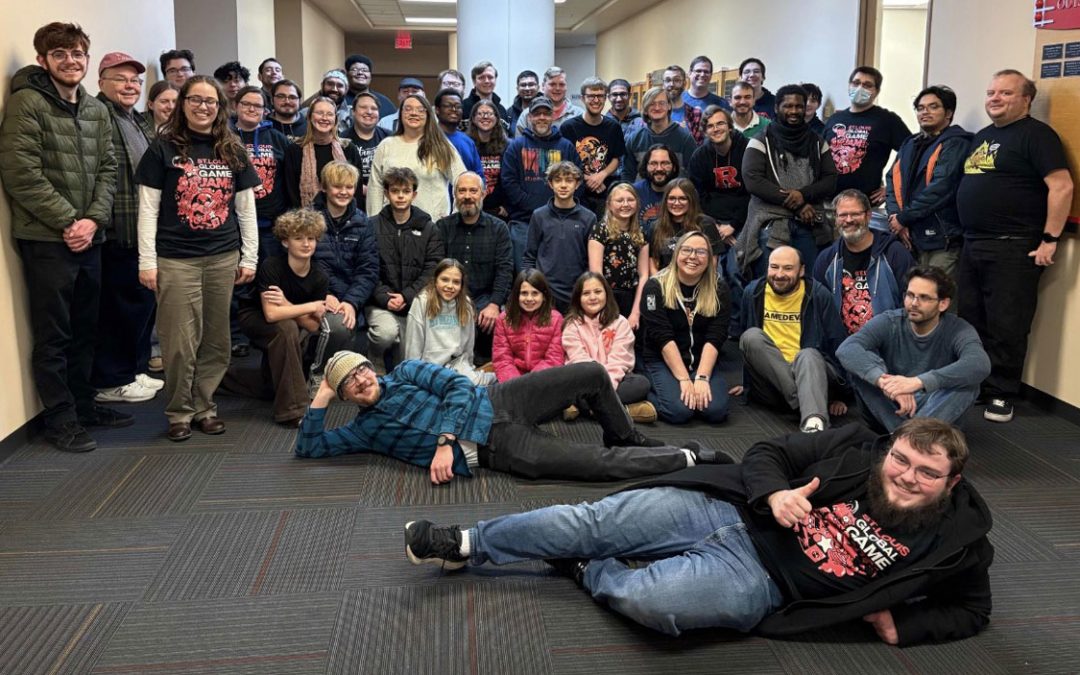A little over a month on the job and boxes still line her office floor while empty bookshelves wait to be filled. Susan Dean-Baar, the new dean of the College of Nursing at the University of Missouri–St. Louis, is still moving into her position, literally and figuratively. She started July 1 at UMSL.
“Have I told you how tired I am of boxes,” she said, chuckling. “I have boxes at home and boxes here at the office.”
Dean-Baar comes to UMSL from Milwaukee, where she was the interim dean of the Zilber School of Public Health and associate dean and former acting dean of the College of Nursing at the University of Wisconsin–Milwaukee. She is a fellow of the American Academy of Nursing, and has a distinguished record of administration, teaching, research and service.
Having been in academic administration for more than 15 years she brings a breadth of experience with her.
“In Milwaukee, I had great opportunities to not only do work at the campus level but at the system level and in the community,” she said.
Dean-Baar was attracted to UMSL because of the university’s commitment to creating a top-notch College of Nursing for the future. She said campuses are in a transformational place and that’s especially true of nursing. UMSL, she said, is positioned beautifully to take on those challenges.
“We’re at a really important moment in terms of health care in this country,” she said. “Health care is changing and everybody involved in health care, including those in the educational realm, have to start thinking about how they’re going to change in order to make sure we’re preparing the right practitioners and the right scientists for the future.”
Dean-Baar received her BSN and PhD from Loyola University Chicago and a master’s degree in rehabilitation nursing from Rush University in Chicago.
UMSL’s location was especially attractive to her considering she has always been at urban institutions. She said UMSL’s commitment to urban communities and students from those areas was really important to her, as was the school’s diversity.
“What that said to me, was this was a community that was really ready to look at how to not just respond to the future but how to create that preferred future,” she said. “I thought, ‘OK this is a good fit. This is the right place to be.”’
She was also impressed with the practice skills of the faculty and their engagement.
“That is not something you see everywhere,” she said. “You do not see the depth of commitment to practice in every college across this country. This faculty is pretty amazing in that.”
Throughout her career, Dean-Baar has been heavily involved in nursing work-force issues and standards and practices. She chaired the national committee that created the framework for nursing professional standards published in 1991.
“Having that framework that has now withstood 20-plus years is something I’m most proud of,” she said. “While it’s been modified and tweaked, the shell of that framework is the same shell that was developed.”
In October, Dean-Baar received the Sigma Theta Tau International Dorothy Garrigus Adams Award for Excellence in Fostering Professional Standards and the Lucie S. Kelly Mentor Award.
Dean-Baar’s fingerprints can also be found on a groundbreaking survey that was conducted of RN’s in Wisconsin. She served as the Project Director for the Wisconsin Center for Nursing Education Survey for 2010 and 2011 and for the 2010 RN Survey Analysis.
Every RN renewing their license in the state of Wisconsin had to complete the survey, which asked them a myriad of questions from what brought them into nursing to their future plans. Instead of a snapshot the survey delivered a full analysis of the nearly 70,000-plus nurses in Wisconsin.
“If we don’t understand our work force we can’t prepare for the future,” Dean-Baar said.
The findings were provided to nursing and health care associations, academia, nurse executives and the legislature. It gave a glimpse of potential work-force issues the state could encounter down the road.
Meanwhile, when a new leader takes over, most usually have a 100-day action plan. Dean-Baar has spent much of her time meeting faculty and staff, campus leadership and people in the community.
“At the end of the 100 days I want to have a really good sense and clear picture of what our priorities are going to be,” she said.
She’ll also work hard to foster the continuation of the great programs already under way.
“Our undergraduate program is stunning on a number of different levels,” she said.
December’s College of Nursing graduates had a 100 percent pass rate on the licensing exam.
“That’s a remarkable achievement,” she said. “It does not happen very often anywhere in this country. You really celebrate when that occurs.”
On a personal front, Dean-Baar said she’s finding St. Louis to be a great community.
“I’m loving it,” she said. “It’s been a really good transition.”















